Related Topics
Revolutionary Philadelphia's Patriots
All kinds of people were patriots in 1776, and many of them were all mixed up about what was going on and how they stood. Hotheads in the London Coffee House stirred up about an inoffensive Tea Act, Scotch-Irish come here to escape the British Crown, the local artisan class and the local smuggler class, unexpectedly prospering under non-importation, and the local gentry -- offended to be denied seats in Parliament like other Englishmen. Pennsylvania wavered until Ben Franklin stepped forward with a plan.
Shaping the Constitution in Philadelphia
After Independence, the weakness of the Federal government dismayed a band of ardent patriots, so under Washington's leadership a stronger Constitution was written. Almost immediately, comrades discovered they had wanted the same thing for different reasons, so during the formative period they struggled to reshape future directions . Moving the Capitol from Philadelphia to the Potomac proved curiously central to all this.
Federalism Slowly Conquers the States
Thirteen sovereign colonies voluntarily combined their power for the common good. But for two hundred years, the new federal government kept taking more power for itself.
Unwritten Constitutional Modification
It is so difficult to amend the Constitution, we mostly don't do it. Our system is to have the Supreme Court migrate slowly through several small adjustments, watching the country respond. Occasionally we have imported new principles, sometimes not entirely wise ones, adopted without the same seasoning.
Revising, Amending, and Skirting The Constitution
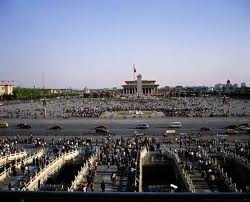
|
| Tiananmen Square |
In some foreign countries, people who dislike the government about some issue wait for a clear day and go in the streets to riot. Some of our own younger people who spent a little too much time abroad have likewise occasionally called their friends on a cell phone and agreed to pour out into our town squares to protest. When you try that in Tienanmen Square (1989) or similar places, machine guns can suddenly end the meeting (2,500 dead). We had the Boston Massacre of 1770 (5 people killed) and Kent State of 1970 (4 people killed), where newsmedia somewhat over-dramatized the risk involved. In general, most Americans feel public demonstrations are neither very dangerous nor very useful.
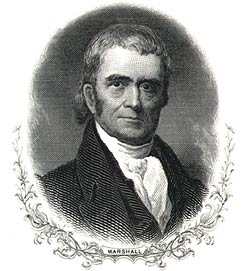
|
| Chief Justice, John Marshall, |
One measure of Constitutional effectiveness can be found in just this public attitude. The citizenry has been told and generally believe that methods for addressing grievances have been provided in the legislative, judicial and executive branches, ultimately leading to the Constitution itself as the last point of appeal. The 1787 framers in Philadelphia probably had this design in mind, but it was not until the third Chief Justice, John Marshall, made it his life's work that the elegance of the system became widely appreciated. The Constitution is the capstone of our system; every citizen's grievance can be appealed within it. If things are sufficiently dire, even the Constitution can be changed.
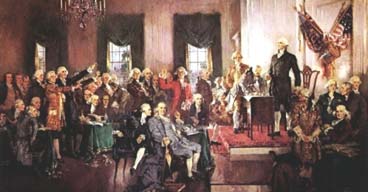
|
| second Constitutional Convention |
A second Constitutional Convention could be called, but most lawyers shudder at what chaos might emerge from making multiple changes without waiting to see how a few worked out. For practical purposes, therefore, amending the Constitution is the last recourse when the government goes astray. Amendments don't easily succeed; hundreds were proposed in two hundred years but only two dozen were adopted. In totalitarian countries, millions of amendments might be envisioned, but either nothing significant would be adopted, or nothing significant would be enforced. In our country, it is sufficiently difficult to succeed that frivolous or ill-advised proposals are discarded or modified into less extreme forms by "due process". But enough amendments do succeed to keep the populace out of street protests. Amendments can succeed, if you and the proposal are really serious. So far the only real appeal beyond an amendment has been another amendment.
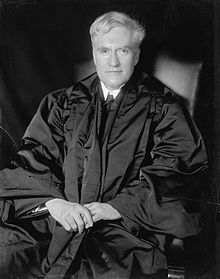
|
| Judge Benjamin Cardozo |
The step provided before an amendment is to appeal to the Supreme Court. That happens about a hundred times a year, with the generally satisfying outcome. Perhaps the only serious criticism of the Supreme Court is the difficulty of "gaining cert.", which is the process of petitioning the Court to take the case, by granting a writ of certiorari. Only about 2% of petitions are allowed to present their arguments, and the Court has protected itself from overwhelming volume by limiting its caseload to instances of conflicts between circuits, and cases involving sovereignty of some sort. For such a selective process to remain acceptable, implicitly the rulings of the various Circuit Courts of Appeal would also have to enjoy general approval. That such is the case is evidenced by the fame and distinction reached by certain Judges of Appeals Courts, like Benjamin Cardozo, Learned Hand, and Richard Posner. In Cardozo's case, he was finally appointed to the Supreme Court, but at such an advanced age and short tenure that his Supreme Court reputation is rather modest; he achieved his reputation as an Appellate Judge. The failure of Robert Bork and several others to achieve Senate ratification illustrates a somewhat different version of the same issue: that the higher courts, not just the Supreme Court, are generally held to do as good a job as human systems allow; supremely gifted judges are not exclusively in the Supreme Court. As you go lower in the court system, more dissatisfaction can be heard, ultimately reaching slander accompanied by knowing grins, such as "You show me a hundred thousand dollars, and I'll show you a Philadelphia judge." Whenever criminals meet justice, such mutterings can be expected. But the point to emphasize is that there are no muttered challenges to the contention that the higher you go in the Judiciary, the more distinguished the judge is likely to be.
That's the federal judiciary, of course. State judiciaries are held in less esteem, although they have the power to put people in jail forever, award multimillion-dollar verdicts and modify the climate of business. Somehow, the prestige of these judicial systems has eroded to the point where a joke can be heard that being a state supreme court justice is a pretty good way to start a law practice. It's hard to know whether prestige has disappeared because of performance, or the reverse. Whether the steady erosion of state legislative power by Congress has resulted in a parallel loss of status in the judiciary is a serious question. In that case, of course, there is very little the judiciary itself can do about it.
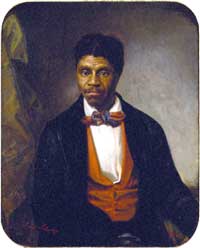
|
| Dred Scott |
The Congress shall have power to .........Regulate Commerce with foreign nations, and among the several states, and with the Indian Tribes
just exactly as it did when for 150 years everyone referred to it as the Interstate Commerce Clause. What has changed is the declaration that Congress may regulate all commerce of any sort, without fear of challenge in the court system. Whatever chances Roosevelt might have had to amend the Interstate Commerce Clause before this uproar, it is clear he could never have achieved its amendment afterward.
The second instance of circumvention is related to the same episode. The insurance industry was highly displeased to find itself regulated by federal agencies, and within six weeks successfully lobbied the McCarran Ferguson Act into law. Congress could not overturn or make an exception to a Supreme Court ruling, but it accomplished the same result by prohibiting federal agencies from taking action in the business of insurance. To maintain regulation for insurance, all of the various states then passed laws establishing insurance regulatory mechanisms, and insurance regulation migrated back to the states. It is now difficult to know whether the same exception could have been created by then re-amending the Constitution. But since the advent of wide-spread current dissatisfaction with health insurance, it pretty clear that an amendment imitating McCarran Ferguson would never pass, today.
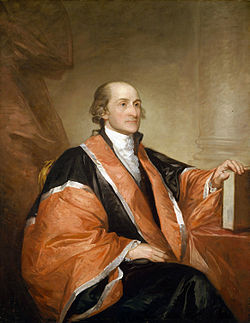
|
| John Jay the Chief Justice |
Finally, the Eleventh Amendment may not have been such a good idea, either. The dispute in 1793 (although it avoided saying so) was about compelling Americans to pay just debts regardless of the person they owed them to. And that included paying debts to former Loyalists. John Jay the Chief Justice was sent to England to negotiate a treaty to settle this matter, but after both nations ratified the treaty, state laws were passed to supersede it. From this evolved the issue of whether a treaty takes precedence over American laws, and the ensuing battle firmly established the preemption of Congress by treaties. Two hundred years later, when the British are our allies and Revolutionary debts fade in significance, many people are uneasy about such clear-cut deference to treaties. Our unwillingness to join the League of Nations, and sign the Kyoto Agreement, or enter into many other international cooperative ventures are related to uneasiness about the unintended expansive power inherent in the Constitutional location of a foreign treaty, enacted at a time of limited communication. We are doomed by demography to perpetual minority status in world forums but forced by economic success to exert leadership or become a target. There is no immediate emergency, but the prescribed generalities of enacting or enforcing treaties need sober reflection in the era of instant communication.
Originally published: Wednesday, June 17, 2009; most-recently modified: Monday, July 22, 2019